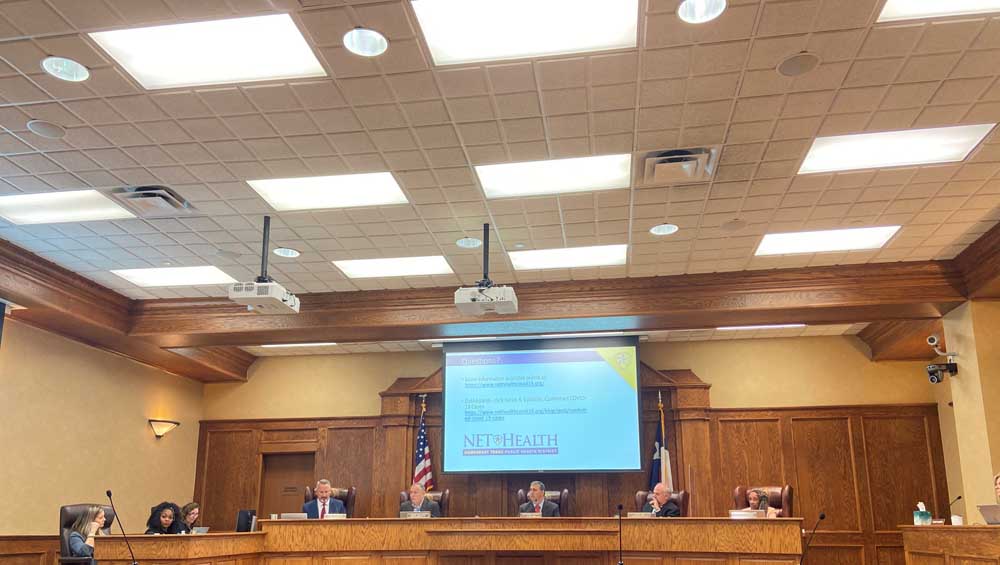Commissioner: ‘I don’t trust’ the CDC
Published 4:48 pm Tuesday, October 5, 2021

- As McGaha and Roberts finish the presentation, they allow a moment for commissioners to ask questions.
Commissioners expressed concern over treatment for COVID-19 after hearing a report from the Northeast Texas Public Health District’s latest stats.
Commissioner Terry Phillips asked if hospitals’ physicians are permitted to administer the antiparasitic ivermectin to treat patients hospitalized with the virus.
Trending
Dr. Paul McGaha, Smith County health authority, said in studies in the United States and other guidelines, such as from the Infectious Diseases Society of America, he has not seen ivermectin recommended.
“I don’t know why we are so focused on vaccines and the people that are not getting the vaccines. There’s a reason why they’re not getting the vaccine,” Phillips said.
“Maybe some of this focus of those that are scared to get it is because they don’t trust the CDC. I notice all your information comes from the CDC. I don’t trust them (the CDC). I know a bunch of other people like me. For those who have those concerns, why don’t we focus on preventative measures of vitamins and all these certain things? To me, I think, maybe it’s money,” Phillips said.
He referenced Merck’s COVID antiviral pill, for which the federal government will pay about $700 per course of treatment, which the New York Times reported Friday is about one-third of the costs of monoclonal antibody treatment. “To me, I believe, follow the money trail. I don’t know,” he said.
“I’d like to see us focus on some of these preventative measures as well, as strong as we are trying to get people to get the vaccination,” Phillips said.
Cary Nix, Precinct 2 commissioner, said he agrees with Phillips and asked about recovery rates in those who receive monoclonal antibody treatment.
Trending
“The recovery rates of people that get over it, they’ve got antibodies, correct? How would you think an antibody’s going to last, versus, do you think that would be more natural than getting the vaccine? Do you think we have any kind of resistance there?” Nix asked McGaha.
McGaha recommended receiving a vaccination so that antibody level coverage stays high to prevent COVID-19.
Nix asked if the public will have to continue to receive vaccine boosters. McGaha said time will tell.
“Some think it will end up being a primary series of three, like many other series of vaccinations that we take. I don’t think it will be an endless boost, boost, boost, but it’s a new illness and we’ll have to see what evolves and it’s a changing virus,” McGaha said, adding the vaccine may have to be reformulated to be the most effective.
“I don’t think it will be an endless cycle, but we may need a booster once a year, like the flu, at the end of the day,” McGaha said.
In their presentation, George Roberts, NET Health CEO and McGaha talked about vaccination rates and newly reported cases.
“The highest age group (affected by the virus) so far has been the 21 to 30 crowd, followed close by by the 31 to 40 crowd,” Roberts said in Tuesday’s presentation.
“Here’s an interesting case right here. The 11 to 20 group is the highest number of active cases right now,” he said.
If COVID-19 hospitalizations in any of the 22 hospital regions in Texas get above 15% of the hospital bed capacity in that region for seven straight days, a County Judge in that region may use COVID-19 mitigation strategies. According to the Regional Advisory Council- trauma service area G Piney Woods data, the area is at 18.4% currently. Weeks ago, the area was at 30%.
In deaths, “Hospitals report to us that they’re seeing younger people that have passed away from COVID-19 than they were before during the last time,” Roberts said.
McGaha presented information on reported deaths after vaccination.
More than 390 million doses of vaccines have been administered in the United States from December 14, 2020, to Sept. 27. The Food and Drug Administration is requiring healthcare providers to report any deaths after a COVID-19 vaccine, even if the cause is unclear. McGaha said those deaths do not necessarily mean the vaccine caused a health problem.
He said recent reports indicate a plausible causal relationship between the J&J vaccine and TTS, a rare serious adverse event concerning blood clots with low platelets, which has caused deaths.
He said Pfizer has been the most used vaccine, followed by Moderna.
In Smith County, the DSHS reports 55.13% of the population that are 12 years of age and older are vaccinated with at least one dose, while 47.83% of that group are fully vaccinated.
Approximately 82.35% of the Smith County population who are 65 years of age or older are vaccinated with at least one dose, while 75.90% of that group is fully vaccinated.
There are approximately 6.9 million Americans who are eligible for a COVID-19 vaccine but have not received it.
McGaha said as data continues to emerge on breakthrough cases, it suggests waning of the COVID-19 vaccine’s effectiveness against severe disease, such as hospitalization and death, is being observed mostly in those 65 years of age and up. He also informed that as of Oct. 3, the regional monoclonal antibody infusion center in Tyler has administered more than 1,806 doses, which McGaha and Roberts say doctors said has helped decrease hospitalization rates.
NET Health recommended booster doses of the Pfizer vaccine six months after the second dose if you are 65 or older, 18 years or older in a long-term care setting, and those aged 50 to 64 with underlying health conditions, such as diabetes, obesity or cancer.
People 18 to 49 with underlying medical conditions and those 18 to 64 with increased risk of exposure and transmission because of occupational or institutional settings, such as healthcare workers and teachers, are also recommended to receive a booster dose.
McGaha said it’s safe to get the COVID-19 and flu vaccines together.





